
-
Find the right food for your petTake this quiz to see which food may be the best for your furry friend.Find the right food for your petTake this quiz to see which food may be the best for your furry friend.Featured products
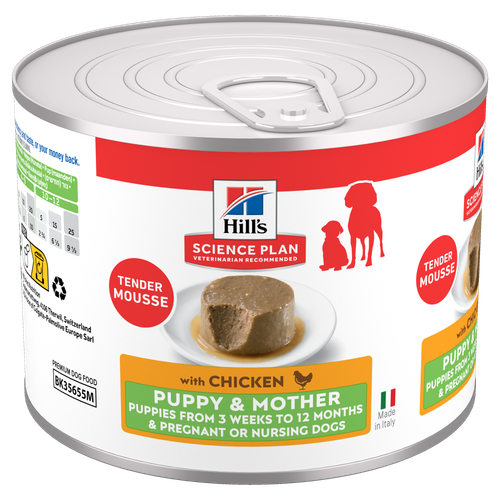 Puppy & Mother Tender Mousse Dog Food
Puppy & Mother Tender Mousse Dog FoodHill's Science Plan Puppy & Mother Tender Mousse Dog Food with Chicken is a complete premium pet food for puppies and pregnant or nursing dogs. Formulated with chicken and other specially selected ingredients, including minerals and antioxidants to support gut health and optimal growth, it comes in a soft mousse texture they'll love.
Shop Now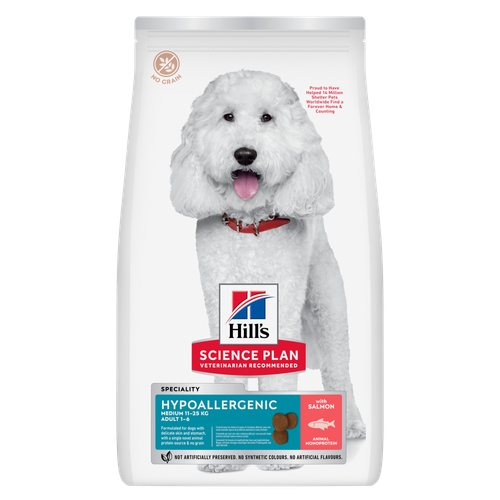 Hypoallergenic Medium Adult Dog Food
Hypoallergenic Medium Adult Dog FoodScience Plan Hypoallergenic Medium Adult dog food with Salmon is a gentle, science-led formula crafted for dogs with food sensitivities. Made with carefully selected, high-quality novel proteins and no grains, it’s tailored to minimise common triggers that can lead to skin and digestive discomfort.
Shop Now Perfect Weight Small & Mini Adult Dog Food
Perfect Weight Small & Mini Adult Dog FoodHill's Science Plan Adult Small & Mini Dog Food with Turkey is a complete premium pet food for adult small dogs from 1 year old that are prone to weight gain or slightly overweight. This deliciously smooth mousse is formulated to deliver the appropriate amount of energy to support weight maintenance in adult dogs.
Shop NowFeatured products Hypoallergenic Dry Cat Food
Hypoallergenic Dry Cat FoodHILL'S SCIENCE PLAN Hypoallergenic Adult cat food with egg & insect protein is a complete pet food for adult cat 1–6 years old. It's formulated for cats with delicate skin and stomach, with limited high quality novel protein sources & no grain.
Shop Now Oral Care Adult Cat Food
Oral Care Adult Cat FoodHill's Science Plan Oral Care Adult Cat Food with Chicken contains clinically proven kibble technology to reduce plaque & tartar build up.
Shop Now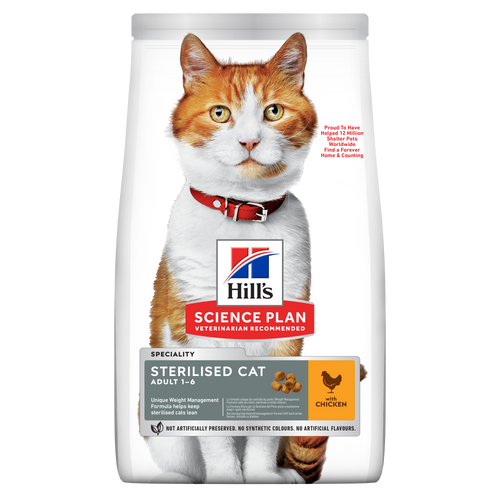 Sterilised Adult Cat Food
Sterilised Adult Cat FoodHill's Science Plan Adult Sterilised Cat Dry Food with Chicken is specially formulated with ActivBiome+ Multi-Benefit Technology. It is a precisely balanced nutrition, tailored to meet the needs of sterilised cats, to help keep sthem lean & healthy.
Shop Now -
Dog
- Dog Tips & Articles
-
Health Category
- Weight
- Food & Environmental Sensitivities
- Urinary
- Digestive
- Joint
- Kidney
-
Life Stage
- Puppy Nutrition
- Adult Nutrition
- Senior Nutrition
Cat- Cat Tips & Articles
-
Health Category
- Weight
- Skin & Food Sensitivities
- Urinary
- Digestive
- Kidney
-
Life Stage
- Kitten Nutrition
- Adult Nutrition
Featured articlesTips for Working From Home With a PetGet helpful information on how to get all of your work done while keeping your dog or cat entertained when working from home.
Read More Tips For Mixing Wet And Dry Pet Food
Tips For Mixing Wet And Dry Pet FoodDiscover tips for mixing wet and dry pet food to ensure balanced nutrition and variety for your pet. For comprehensive feeding advice, visit Hill's Pet UK.
Read More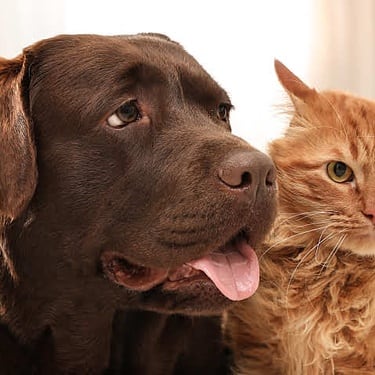 What Cleaning Products Are Safe for Pets?
What Cleaning Products Are Safe for Pets?Learn which cleaning product ingredients can be hazardous for dogs & cats, which alternatives are safer and tips for using cleaning products around pets.
Read More -
Chronic kidney disease in dogs
Chronic kidney disease in dogs
What is kidney disease in dogs?
Chronic kidney disease (CKD) is defined as any abnormality of one or both kidneys that has been present for several months. CKD affects about 1 in every 10 dogs [1].
Your dog’s kidneys are vital to removing waste substances from the bloodstream and maintaining the balance of fluid and minerals within the body. But if the kidneys can’t do their job, the result could be life-threatening for your dog.
What causes kidney disease in dogs?
There are two main categories of kidney disease in dogs: acute and chronic. Signs of acute kidney disease usually manifest over a week or month’s time, while chronic kidney disease is defined as kidney damage that has been present for at least three months. Common causes of kidney disease & its progression include:




Early detection of kidney failure in your dog
Signs of serious illness only appear after 75% of kidney function is already lost[1], so the sooner kidney disease is diagnosed, the more time there is to address the underlying cause or slow the disease’s progression. CKD is progressive and irreversible, but your veterinarian can help provide long-term care and show you how to track signs in older dogs.
What are the signs & symptoms of kidney disease in dogs?
The signs of early-stage kidney disease are not visible. On diagnosis, CKD has already been present for some time but may be managed with the help of vet-approved dog food for kidney disease. Signs of late-stage kidney disease tend to be similar but are far more noticeable to pet parents.


















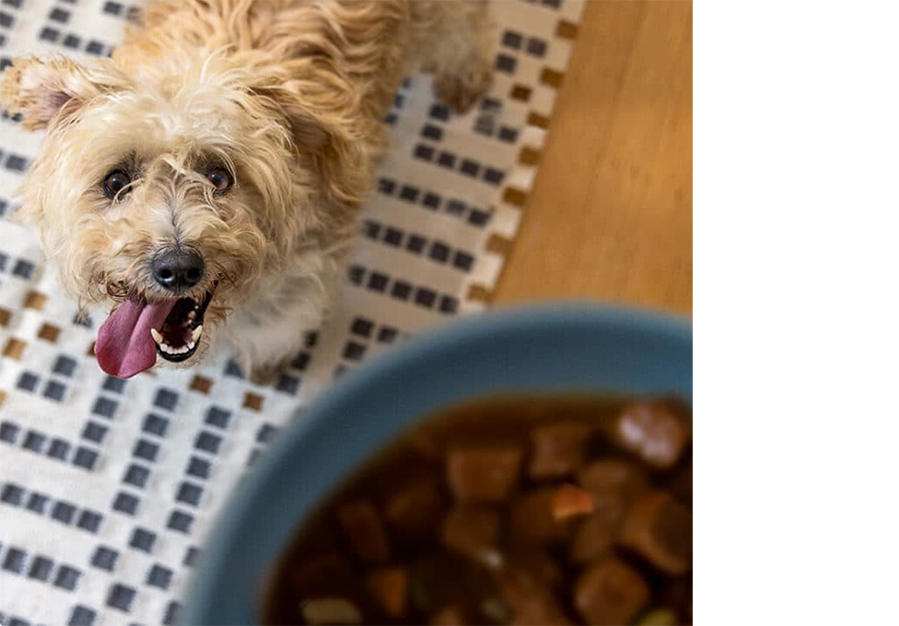
Nutrition for dogs with kidney disease
If your dog has kidney problems, the right nutrition may be able to make a positive impact on their quality of live and potentially even lengthen their lifespan. Specially formulated nutrition for dogs with kidney disease can be beneficial by having less protein and phosphorous than other pet foods. Phosphorus restriction can lessen the severity of the symptoms and progression of kidney damage, while controlled, high-quality proteins can help restore normal acid-base levels.
Nourish your pet's microbiome
New evidence supports a link between gut health and kidney health [2]. Nutrition that is formulated with ingredients shown to nourish the gut microbiome can help reduce waste products that can be harmful to their kidneys.
What about nutritional yeast for dogs with kidney disease?
While it has gained some popularity online, yeast is relatively high in phosphorus, which could be a concern for dogs with CKD. Similarly, many websites now propose creating a raw diet for dogs with kidney disease but fail to mention the range of factors to consider, such as contamination risks, providing the right balance of nutrients, and the overall cost. When looking into nutritional options for dogs with kidney disease, it’s always best to get a specific recommendation from your veterinarian.
Nutrition for dogs with kidney disease
If your dog has kidney problems, the right nutrition may be able to make a positive impact on their quality of live and potentially even lengthen their lifespan. Specially formulated nutrition for dogs with kidney disease can be beneficial by having less protein and phosphorous than other pet foods. Phosphorus restriction can lessen the severity of the symptoms and progression of kidney damage, while controlled, high-quality proteins can help restore normal acid-base levels.
Nourish your pet's microbiome
New evidence supports a link between gut health and kidney health [2]. Nutrition that is formulated with ingredients shown to nourish the gut microbiome can help reduce waste products that can be harmful to their kidneys.
What about nutritional yeast for dogs with kidney disease?
While it has gained some popularity online, yeast is relatively high in phosphorus, which could be a concern for dogs with CKD. Similarly, many websites now propose creating a raw diet for dogs with kidney disease but fail to mention the range of factors to consider, such as contamination risks, providing the right balance of nutrients, and the overall cost. When looking into nutritional options for dogs with kidney disease, it’s always best to get a specific recommendation from your veterinarian.
Related articles

Learn about some common signs that your dog might be allergic or intolerant to certain foods and what you can do to help get them the nutrition they need.

Learn about the symptoms, diagnosis and treatment of cancer and tumors in dogs, providing pet owners with valuable information and resources when dealing with canine cancer.

Puppy and pet dieting, cat nutrition and dog nutrition information from Hill's Pet

Have you noticed your dog drinking lots of water all of a sudden? Excessive thirst in dogs, also known as polydipsia, is a common observation amongst dog parents, and one you shouldn't ignore.
References: 1Lulich JP, Osborne CA, O’Brien TD, Polzin DJ. Feline renal failure: questions, answers, questions. Compend Contin Educ Pract Vet. 1992;14(2):127–153. Brown SA. Renal dysfunction in small animals. The Merck Veterinary Manual website.

